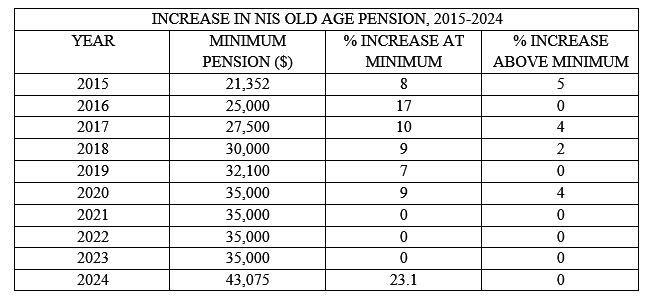Dear Editor,
An elderly NIS pensioner approached me, recently, for an explanation as to why the government has not increased NIS pensions above the minimum. The NIS pensioner currently gets a pension of about $52,000 per month, the same amount that he was getting in 2020, the year when the last increase in pension was effected. Since I was not in a position to give him a satisfactory answer, I have decided to highlight this matter through this letter, in the hope that it generates immediate action by the concerned Minister(s).
The table below indicates the yearly increases in NIS Old Age Pensions since 2015. As is evident from the table, the Coalition Government increased the minimum pension (equivalent to 50% of the minimum wage) every year between 2015 and 2020, with the minimum pension increasing from $21,352 in 2015 to $35,000 in 2020. Following their installation in office, the PPP/C Government, while increasing salaries in 2021, 2022 and 2023, failed to similarly raise the NIS minimum pension for those years, only doing so in 2024, when the minimum pension was increased by 23.1% to $43,075. The government’s failure to compensate NIS old age minimum pensioners for the 3 years, has resulted in an accumulated loss in unadjusted income of $92,496 for each pensioner.
As is evident from the table, the Coalition Government increased the minimum pension (equivalent to 50% of the minimum wage) every year between 2015 and 2020, with the minimum pension increasing from $21,352 in 2015 to $35,000 in 2020. Following their installation in office, the PPP/C Government, while increasing salaries in 2021, 2022 and 2023, failed to similarly raise the NIS minimum pension for those years, only doing so in 2024, when the minimum pension was increased by 23.1% to $43,075. The government’s failure to compensate NIS old age minimum pensioners for the 3 years, has resulted in an accumulated loss in unadjusted income of $92,496 for each pensioner.
The table also reveals that the last increase in NIS old age pensions above the minimum, was in 2019. A 4% increase was granted by the Coalition Government, which was implemented from January 2020. Since then, no further increase was given, hence the query by the pensioner. This has had several deleterious consequences. Importantly, money has a time value, that is, the value of today’s dollar is not the same as that of four years ago. The basket of goods bought with $52,000 dollars in 2020 will cost substantially more in 2024. In the absence of savings or other income to supplement his pension, our pensioner would have experienced a reduced standard of living through no fault of his.
Second, as correctly identified by a letter writer (SN, February 6, 2024) a great deal of angst has been created as a result of pensioners who were receiving just above the minimum pension. These pensioners are now being forced to accept the new minimum pension, instead of having their pension suitably adjusted to maintain the status quo ante.
It is true that NIS must examine the sustainability of any increase. On the income side, NIS revenues have suffered because of the failure of successive governments to implement the recommendations of the Actuarial Reports; low returns on Treasury Bills (its preferred source of investment), and on investments such as Berbice Bridge and CLICO; and high delinquency rates among employers and self-employed. On the expenditure side, an aging population, resulting in increased payout of benefits; and rising administration costs, among others, have damaged the profitability of the Scheme.
None of this is the fault of the pensioners. If NIS is being prevented from paying increased old age pensions above the minimum, then the Government must act decisively to remove the impediments and/or provide relief financing. I believe that the NIS is still a member of the Cooperative Finance Administration (COFA). I believe the COFA Act has not been repealed. This Act has provisions for the Government to meet any shortfall, in any financial year, of any of the financial institutions falling under the Act.
Even if it is assumed that the Act no longer exists, nothing stops the Government from transferring the necessary resources to NIS. This is being done, already, in the specific case of GuySuCo, which benefitted from over $50 billion in transfers under the Coalition Government. The entity continues to be the recipient of billions of dollars in transfers, annually, under the current Government. It was the intent of the Coalition Government to transfer resources from the Natural Resource Fund (NRF) to the NIS, so that the Scheme can meet its obligations to its contributors, pensioners, and other beneficiaries. It will be recalled that the Scheme was similarly bailed out, in 2016, when a deal was signed for the Scheme to recover $5.6 billion it lost in CLICO in 2009.
NIS ceases to function as an effective social safety valve when beneficiaries are denied their rightful pension, after many years of contributing to the Scheme. The great Robert (Bob) Nesta Marley sang, “In the abundance of water, the fool is thirsty”. In the abundance of resources, unheard of in the annals of our history, the NIS pensioners above the minimum are made to suffer. The Government must act now to bring permanent relief to this category of pensioners.
Sincerely,
Winston Jordan
Former Minister of Finance





